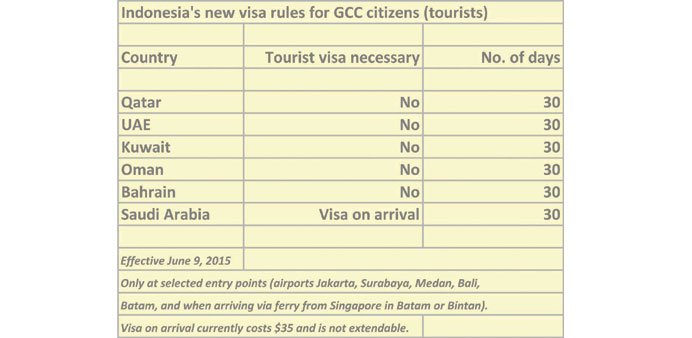By Arno Maierbrugger
Gulf Times Correspondent
Bangkok
As part of an overall tourism offensive, Indonesia plans to increase the number of well-spending visitors from the Middle East and, at the same time, invites investors from the Gulf to take part in tourism projects in specially designated tourism development zones.
Indonesia, whose tourism potential is big due to the country’s unique geography and diverse culture, as well as its pristine beaches and unspoiled nature on many of its more than 17,000 islands, is struggling to chase its regional peers such as Malaysia and Thailand in terms of tourism numbers, mainly due to its poor touristic infrastructure on the ground. While Thailand and Malaysia attracted 24.8mn and 27.4mn visitors, respectively, last year, Indonesia counted just 9.4mn international arrivals in 2014, after all a 7.19% increase from the preceding year. Arrivals from January to April 2015 reached 3.05mn, up 3.4% from the same period last year.
Interestingly, the number of visitors from the Middle East grew by 26% to 170,000, which inspired the country’s Tourism Minister Arief Yahya to drum up business at the Arabian Travel Market (ATM) held in May in Dubai.
Yahya said that, in general, visitors from the Middle East to Indonesia came in family groups and stayed “relatively longer” than other tourists.
“They are also generous as they are spending between $1,400 to $1,700 per visit and per person compared to around $1,140 spent by visitors from other regions,” Yahya said, adding that the ministry will strengthen its marketing activities in the Middle East and “play an active part” in industry events such as the ATM.
Yahya also addressed prospective investors in the hospitality and property development sectors from the Gulf region, among them Emaar Properties, Tasweek, Damac Properties and Paramount Hotel & Resorts. The minister offered them investment opportunities in the tourism sector in a number of “Tourism Special Economic Zones” including Banten province west of Jakarta, Lombok, an island neighbouring Bali to the east, and Bintan, a holiday destination south of Singapore.
He also pointed out that there is well-developed air connectivity between Indonesia and the Middle East. From the region, Egypt Air, Emirates, Etihad, Kuwait Airways, Oman Air, Qatar Airways, Saudia and Turkish Airlines are all flying to Jakarta. In turn, Indonesia’s national airline Garuda has just one destination in the Middle East (Jeddah), but has a code-share agreement with Etihad, using Abu Dhabi as a hub for connecting Middle East flights.
However, neither tourists nor investors can expect to break fresh ground in Indonesia in terms of discovering or developing fresh, exotic destinations, which would be a unique sales proposition for Indonesia, critics say. Instead, according to Yahya, efforts to develop the tourism industry will remain focused on Bali, nearby Lombok, the holiday islands of Batam and Bintan near Singapore, and main cities such as Jakarta and its surrounding regions, Surabaya and Medan, rather than on more remote spots in the world’s largest archipelago, as the before mentioned destinations “generate about 90% of the country’s revenue from international tourists,” according to Yahya. With this in mind, the government’s marketing budget for tourism has been increased fourfold to 1tn rupiah ($75mn) for 2015.
“We cannot promote every destination in Indonesia as it’s very expensive,” Yahya said at a press conference held in Jakarta on June 23. “Our strategy is that tourism development follows infrastructure development.” Industry experts commented that the strategy is double-edged as money spent for destinations that are already well-established could also be used to develop new destinations in the huge country, but they also conceded that this would be much more expensive as tourist infrastructure would have to be built from scratch at most such places with unevolved touristic potential.
At least, Indonesia this month granted visa-free entrance to citizens of 30 countries including five of six Gulf Cooperation Council (GCC) countries.

